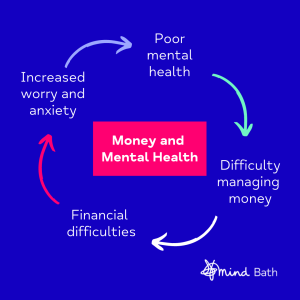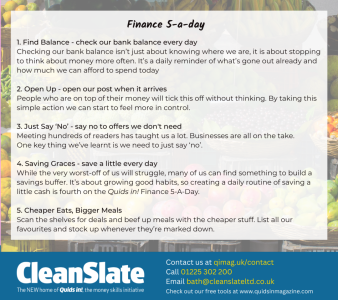According to a survey conducted by Money and Mental Health, almost four in ten (39%) people with a mental health problem said their financial situation had worsened their mental health problems. And with the cost of everyday living, such as groceries, energy bills and fuel, having risen recently, many of us are worrying about money for the first time.
If you’re worrying about money, there’s nothing to be ashamed of. You are not alone.
Call Citizens Advice Freephone Adviceline on 0808 278 7897 for advice on work, benefits, debt, pensions and energy solutions. Or reach out to Clean Slate on 01225 302200. They can support you with finding work (or better paid work!) and to re-organise how you manage your money via their money health check.
Below you’ll find further information to help you understand the link between money and mental health, plus tips on how to organise your finances, speak to services and where to go for support with your mental health.
Worrying about money can impact your mental health, while living with a mental health condition can make earning and managing money more difficult. This can feel exhausting and create the feeling of being stuck in a ‘vicious cycle’ – money worries lead to difficulty managing money and vice versa.

Some common ways your mental health can affect the way you deal with money are:
Some common ways that money worries can affect your mental health are:
There are things you can try to help organise your money. Some tips are:

It’s up to you whether you tell services, such as your bank, energy provider or council, about your mental health. Here are some tips on how to deal with services:
If you are experiencing money problems and mental ill health, there is help available. Below are some useful tips, organisations and resources.
If you are experiencing difficulties with your mental health due to money worries, or if you would like to discuss your wellbeing, you can reach out to us in confidence – our details can be found here.